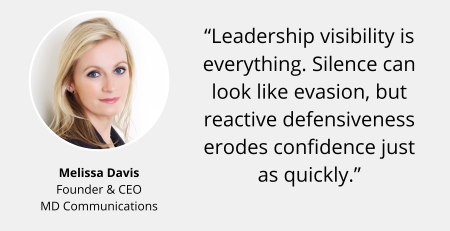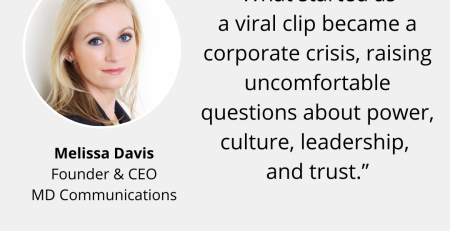Our CEO Melissa Davis looks at why it’s always best to start crisis management before the crisis starts. And in terms of memos or internal communication via the intranet, that means planning for things occasionally to leak.
‘I think we should put a memo out.’
Communicators in the legal sector will have heard those words many times in their career. It’s often the go-to view of Boards and Partners who need to share news.
Just as often, it’s the chosen channel for asking colleagues to do something – or, as we saw last week, asking them not to do something.
We’ve all got a view on the current, worrying scenes we are seeing from Ukraine and on the actions taken by Russia, and the Russian leader Vladimir Putin.
It’s hard not to, when you watch the news, hear it on the radio or catch the latest via social media or the internet. It’s hard for many to avoid sharing their horror, their views and in some cases their suggested solutions even.
A current example is Norton Rose Fulbright (NRF). Its leadership team decided that the right thing to do was to send out an internal memo urging its lawyers, wherever they were in the world, to keep shtum about the issue.
The memo went out. Whether there was any contrary view to it going out, we’ll never know. What we do know is that it became news in its own right, which can’t be what the leadership team intended when someone sat down to draft it.
Reputation vs risk
Were they right? Well, that’s a difficult one to answer. It all depends on your view.
Some will say it was a sensible move by a well-respected firm with global reach who didn’t want their name, reputation and brand associated with any comment on a hugely emotive world event.
Others would argue that this is a moment in history. If you don’t – and indeed can’t – have a public view on it, then when can you have one?
What we do now know is that the chair of the firm in Canada fell into the latter camp.
Walied Solomon made his views known. Fairly widely as it turned out. He took to LinkedIn and to Twitter to make clear his disagreement with what the leadership had done. Never a good look at the best of times and this clearly isn’t the best of times.
It didn’t help that the post he quote-tweeted made reference to – allegedly, I should say – NRF’s ‘extensive Russian client list’. That in itself was something the firm probably didn’t want people focusing on. Sharing it only broadened its reach.
But more than that, it showed the danger of a contentious internal memo. The communicator’s worst nightmare – when something internal moves to being very much external.
Any risk assessment on the original memo – and I presume there was one – would have flagged this as a risk. The intention was no doubt to protect NRF’s reputation by avoiding lawyers speaking out and upsetting clients and potential clients. The outcome was the kind of coverage that no firm with any reputation really wants.
It all ended as well as it could. NRF clarified its position saying it wasn’t trying to prevent comment on the conflict and that it ‘unequivocally stands with the people of Ukraine and against the invasion of their country by Russia’.
For balance on this, a statement from NRF issued to media added that the firm is working to comply with all sanctions and new laws, and this will result in ending relationships with certain clients.
NRF is also raising funds to support humanitarian efforts to help the people of Ukraine, reports say.
Its Canadian chair then thanked the leadership team for clarifying its position, drawing a line under a very self-created problem for the partnership.
Plan for the worst
In an ideal world, none of us would ever have to think about anything written for an internal audience ever being seen by someone who wasn’t internal.
But the reality is very different. Some legal media outlets – you know the ones – thrive on stories about internal memos which failed to stay internal.
I spent many painful hours running the Law Society press office and dealing with leaked internal memos in the hands of the media.
So does that mean we should never send another memo? Of course not. But it does mean you have to be prepared and that starts with the drafting.
The best reputation advice always starts before action is taken. It means considering all the possible outcomes and, most importantly, preparing for the worst.
In essence, ask yourself a simple question – would you be happy to see the content of the memo published in part or in full? Increasingly, in a digital world, the chances are that you might.
If the answer to that is no, then please consider why you’re even sending it. Maybe you need to modify the tone or language. Maybe you need to think again as to whether it’s the right time or the right way to communicate.
If the answer is yes, then send it but bear in mind it could end up in the hands of someone outside the business. Publish and be damned, as they say in the media world.
After the event is too late
We regularly work with businesses on crisis management after something has gone wrong. It’s remarkable how often it takes leadership teams by surprise.
Our advice would always be to start the crisis management before the crisis starts. And in terms of memos or internal communication via the intranet, that means planning for things occasionally to leak.
Sensitive topics, such as the war in Ukraine, are issues which need particularly careful management. A blanket ‘do this’ or ‘don’t do that’ is always riskier when emotions are running higher. Risk assessment by someone other than the author or authors of the email is vital.
This is where communicators have their role. We act as a first set of independent ‘eyes’ on a message or a memo. It’s our job to spot the risks and flag them. It doesn’t always make you popular but it’s a crucial role for any business and its reputation.
There’ll always be a place for a memo or email. The key is finding the right place, the right words and the right time.
When it comes to reputation management, prevention is always better than the cure.












